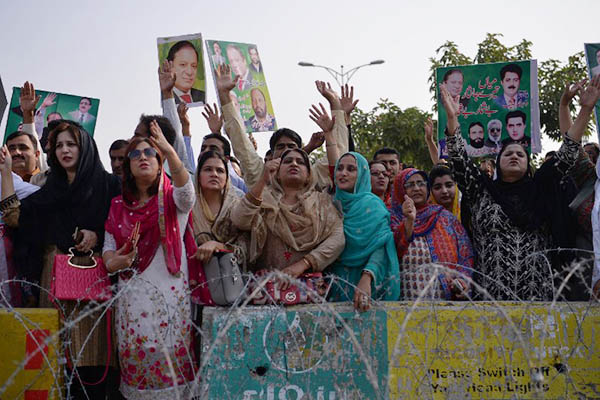
Aamir Qureshi—AFP
What led to ousted premier Nawaz Sharif’s return to Pakistan?
Ousted prime minister Nawaz Sharif has returned to Pakistan to face the National Accountability Bureau (NAB) in court and respond to charges of corruption and money laundering. The move appears to suggest a change in party policy, which had earlier espoused defiance and exile even as the ruling Pakistan Muslim League (Nawaz) struggled to retain its popular support for general elections due next year. What has made Sharif change his mind, as articulated by his daughter Maryam Nawaz when she followed him to London? What has transpired to make him return to Pakistan and face the music, which may also include going to jail?
After Sharif’s sacking by the Supreme Court the PMLN looked to be developing a central schism with Nawaz Sharif and his family on one side and younger brother Shahbaz and his family on the other. As chief minister of Punjab province, Shahbaz was not actively involved in campaigning for Kulsoom Nawaz’s NA-120 by-election, with some pundits claiming he had sidelined, along with former interior minister Chaudhry Nisar Ali Khan, because of their well-known inclination to side with the establishment. Just last week, Nisar publicly opposed P.M. Shahid Khaqan Abbasi’s foreign policy in Parliament, reflecting the thinking of the Army. That both Nisar and Shahbaz have reverted to backing Nawaz signaled a change of mind and, at least, a temporary white-flag meeting between the two sides of the split.
Sharif has apparently returned because a second exile didn’t appeal to him so close to the next polls. His decision to return must have been informed by what he went through during the seven years he spent in Saudi Arabia after being ousted by General Musharraf. The party split of that era was permanent, with the offshoot Pakistan Muslim League (Quaid) still a minor political force; a further split this time could succumb it to the lure of the establishment-backed Tehreek-e-Insaf of Imran Khan.
The new element in the chemistry of the latest move could be Shahbaz and Nisar’s decision to rally around Sharif and persuade him that he could face litigation so long as the courts and media felt he had not been completely dumped by the establishment. The “signaling” that the party is in communication with the powers-that-be—through the Shahbaz-Nisar duo—could be the most decisive element in Sharif’s return home.
